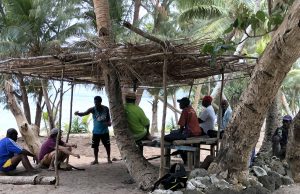The recent 20/20 Insights to Research seminar focused on the topic of ‘Innovative Research Methods’.
GIFT members Dr Ross Westoby, Dr Sam Meng, Dr Elaine Yang and Sima Vaez Eslami, and Nina Dhirasasna presented short, sharp, incisive insights into their research. 20/20 is based on the principles of Pecha Kucha – a simple presentation format where you show 20 images, each for 20 seconds. The images advance automatically and you talk along to the images. it’s a great fun way to share research.
Dr Ross Westoby: “Participant action research (PAR): field insights and application to tourism research”
 Before joining GIFT as a Research Fellow, Dr Ross Westoby worked in the international development space using participatory methodologies. Ross shared lessons learnt from ten years of field work and offered insights relevant to participatory tourism. “Tourism should be about benefiting communities while not undermining local culture and the environment. Research should also ultimately lead to ‘action’ for the people it serves.”
Before joining GIFT as a Research Fellow, Dr Ross Westoby worked in the international development space using participatory methodologies. Ross shared lessons learnt from ten years of field work and offered insights relevant to participatory tourism. “Tourism should be about benefiting communities while not undermining local culture and the environment. Research should also ultimately lead to ‘action’ for the people it serves.”
Dr Elaine Yang and Sima Vaez Eslami: “Wayfinding using Eye-tracking and Think Aloud Methods”
This presentation gave an example of mobile eye-tracking in a real-world setting for a wayfinding study. Wayfinding is an important aspect in tourism, where visitors navigate an unfamiliar environment and find their way to places and public transportation.
The project explored how visitors navigate an unfamiliar urban environment to find transport stations, with an aim to provide recommendations to city council to improve public transport planning and promote more sustainable transportation choice. Research has shown that Brisbane has the worst public transport system among capital cities in Australia and finding bus stops and stops causes confusion and challenges for first-time visitors.
The study used a multimethod approach, consisting of mobile eye-tracking and think aloud methods. Eye-tracking is psychophysiological technique used to collect data on what the participants see when navigating the city whereas think aloud requires the participants to verbalise their thoughts when working on the wayfinding task. Both forms of data were collected using the Tobii 2 Mobile Eye-tracking glasses. Preliminary findings of the study, including heat map and gaze plots were presented, together with reflections on the challenges and opportunities of using mobile eye-tracking in research.
Nina Dhirasasna: “Systems thinking and simulation: a method for complex tourism industry”
Nina’s research asked: “Is your research like a photo – static and out-of-date the moment the shot is taken?” Rebuilding your research problem in a computer simulation, enables you to test what will happen to your research problem under different scenarios and into the future.
To build a simulation, you need to take a systems thinking approach, by viewing that everything is connected as a ‘feedback loop‘. That is A will impact B, B will impact C, and C will eventually impact A. Systems thinking approach and simulation method is suitable for the tourism sector for two reasons:
- the tourism sector includes many sub sectors such as hotels, restaurants, transportation, environment, government, tourists etc.
- the world has become more complex and changes quickly. Despite of analytical power and cleverness, many solutions are short sighted and do not consider for future consequences.
As tourism researchers, we are obliged to offer solutions that account for problem dynamics and ever changing world overtime. A systems thinking and simulation method can be applied to any size of research, from a country to a small island, from a single company to single individual. It works with both quantitative and qualitative data, historical and future projections because everything is a system.
If you are interest in using a systems thinking and simulation in your next project, Griffith University Systems Modelling Group can help you. They have experts in tourism, climate change, finance, product life cycle and more. Want to hear more about systems thinking? Keep your eyes out for our introduction to systems thinking workshop this mid year.